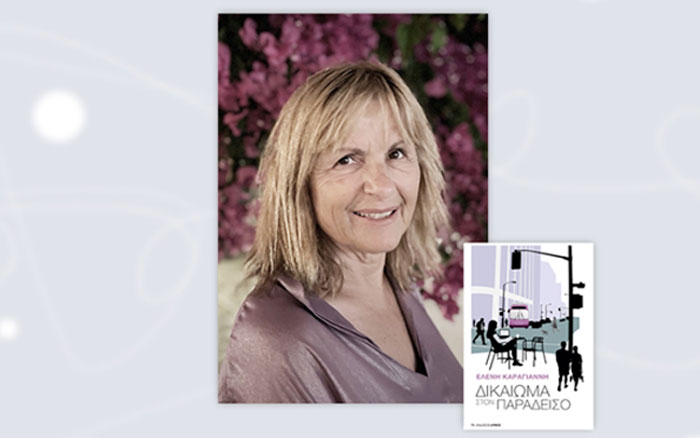Tribute to the book "Right to Paradise" by Child Psychiatrist-Psychotherapist Eleni Karagianni in the weekly newspaper "Machitis" of Arta:
On the condition that we give up the fantasy of a Paradise that is free, that has no trouble, that has no personal responsibility. Because then Heaven is fragile and others are in danger of becoming Hell..
Heaven is the people.
Provided we accept wear and tear and human loss.
On the condition that we give up the fantasy of a paradise that is free, that has no trouble, that has no personal responsibility. Because then Heaven is fragile and others are in danger of becoming Hell.
Why do we imagine Heaven as passive indulgence?
Is it possible to have Heaven without creativity and active participation?
Frustration in interpersonal relationships mainly leads to steps in the psychotherapist's office. We are increasingly convinced that we are made as humans to experience fulfillment in love and authentic sharing with others. We thirst for closeness, for mutual involvement, for mutual reflection and enrichment of life.
Heaven is the people.
The lives of others, the continuities, the diversity, the conflicts, the impasses, the transcendences, the creativity of others.
The existential questions that emerge beyond the psychological answers.
Individual Heaven does not exist.
The desire of meeting, the powerful moment of confrontation with the truth of the other.
The longing to create the unique meeting place between us.
Those that will be revealed in love: both the dark and the light parts.
The unique feeling of completeness when we manage to understand each other, to empathize, to share experiences, to inspire and to be inspired... And to start all over again, again and again!
Heaven is people and interpersonal relationships.
People file their stories. As they give personal answers, their stories go from individual to universal.
There are no good and bad experiences. Experiences are classified into processed and unprocessed. Refined are the experiences that tap into the richness of success, the wisdom of failure.
The author's clinical work allows her to participate and be inspired by experiences of processed experiences that lead to change, in a way that strengthens optimism about life and people.
In awe of the people who trusted her and the changes they are achieving, she returns the optimistic look.
She has no choice: Even if her heroes don't always make it, their stories support hope.
Some of their stories are:
The tragic muse expresses the difficulty of every authentic creator to transcribe in his art all the suffering of human existence.
Love your own questions. It's been a long time now that there are no questions. Why were the questions lost?
Poetry is what gets lost in translation. Poetry is the secret relationships of concepts. Poetry in architecture. Architecture is nothing more than material relations, dimensional relations, settlement and environment relations... Nostalgia, memory, the account of a life, reflection open paths of inner journeys. Present, past and future intertwine, inextricably linked.
Freedom with love.
Voices of silence. The silence of dementia, the silence of emptiness. A barren, raw silence. Uninterpretable silences. Painful dead-end silences. We also get angry with silence. Events where failure leads to silence. How much wisdom does it take to make sense of decay and death? Ah, that generation lost in transition!
How much loss do we need to grow? Small and large losses that build the tragedy of existence, inevitable in the constant change of life. Each loss brings previous losses to the surface of memory. And every loss, a parting. What is there after death?
Life itself sets the measure of authenticity.
Within a beautiful setting, the contrast of the ugliness of failed relationships is more emphasized.
How can a violent movement that does not include empathy be called love, when love, stripped of freedom, strays into power, when the possibility of a relationship blossoming in the midst of risk is sacrificed on the altar of reassurance...
As we grow older do we only lose? Is it the only way to gain wisdom? Why do we reduce the freedom of love to agony? Why do we avoid goodbyes?
The lone wolf.
When trees bend in the wind to keep from breaking.
The right to celebration. There is no celebration without an opening. There is no celebration without giving value to people. Why is it hard for people to celebrate? Because during the holidays, while trying to escape, they find themselves confronted with their true selves.
Read it.
Eleni Karagianni is a psychiatrist and psychotherapist. At the "Antistixis" institute he experiences the paradox: as people search for a solution to their difficulties, they unsuspectingly unfold the beauty of their souls. A source of inspiration is the eternal human desire, inexhaustible flame of life, as it confronts imperfection, deterioration and failure.
Kostas Trahanas
You can see the article in the newspaper "Machitis" here:
https://www.maxitisartas.gr/single_page.php?catid=4&id=26430&fbclid=IwAR2KMf6bc3BmST57suFfmeDTWYv–qZgo3aKwuBh6oyzgfl48qeQm4AbVPU


